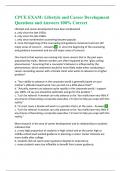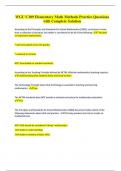Exam (elaborations)
OCR A A-Level Biology: 6.2.1 Cloning and Biotechnology 117 Quiz Questions Correctly
- Course
- Institution
What are clones? - ️️Genetically identical copies of an organism What is a clone? - ️️Genes, cells or whole organisms that carry identical genetic material because they are derived from the same original DNA (Genetically identical organisms) What are examples of clones? - ️️Identical...
[Show more]












